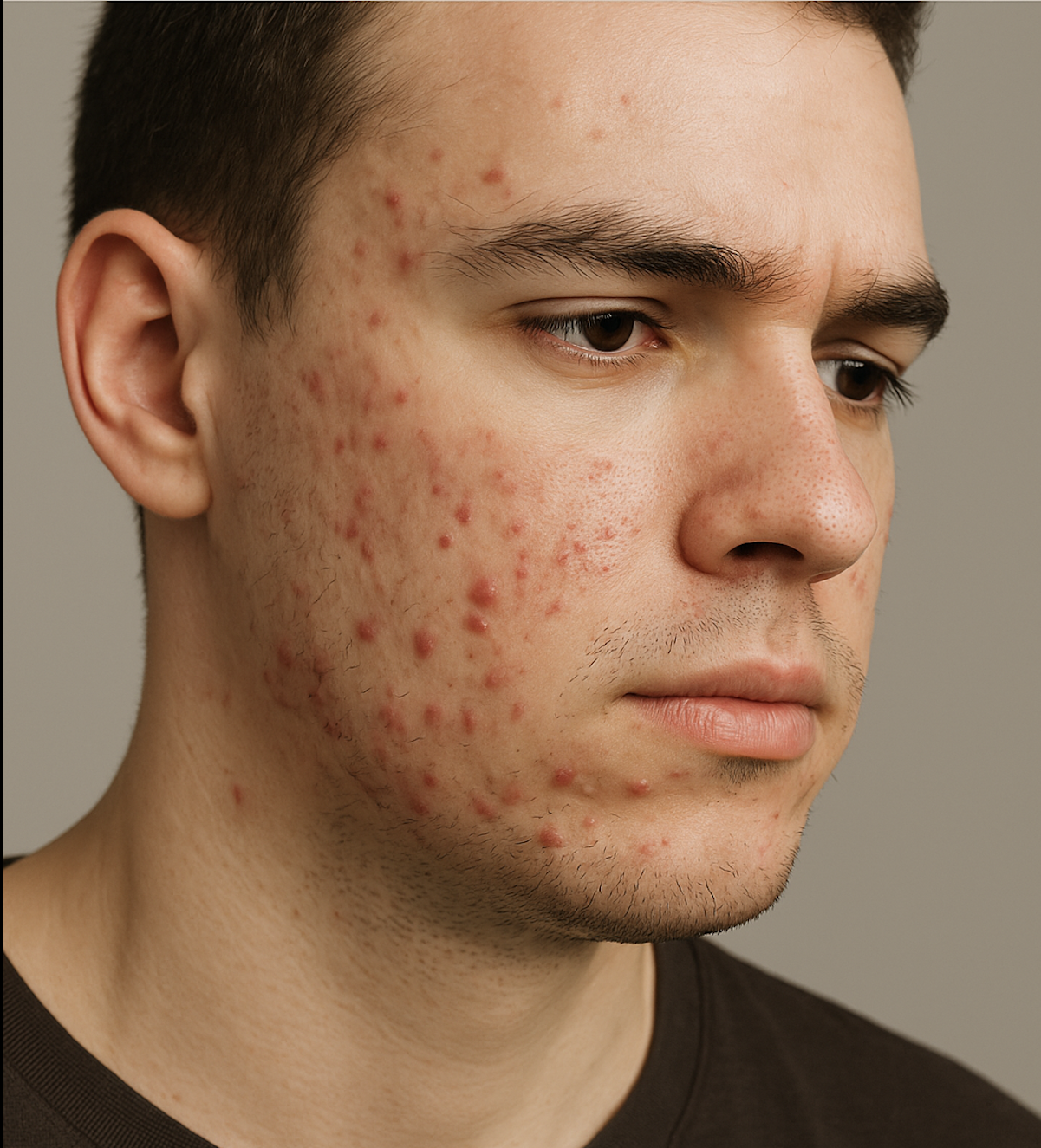Why Acne Happens Suddenly & What You Can Do About It
Understanding Acne: Causes, Treatment, and How to Finally Take Control

Have you ever looked in the mirror and noticed that, out of nowhere, a painful bump has appeared on your face? I certainly have. It always seems to happen before important events—like my skin has its own terrible timing.
After years of trial and error (and plenty of frustration), I've learned that sudden acne isn't random—there's usually a reason. Understanding these triggers was the first step to finally getting my breakouts under control.
Why Acne Appears Overnight
That pimple you swear wasn't there yesterday? It actually started forming days ago. Here's what's really happening beneath your skin's surface:
- • Day 1-3: Pore gets clogged with oil and dead skin cells
- • Day 3-5: Bacteria multiply in the clogged pore
- • Day 5-7: Inflammation causes visible redness and swelling
Common Triggers
- • Hormonal fluctuations (periods, pregnancy, PCOS)
- • Stress (cortisol increases oil production)
- • New skincare/makeup products
- • Diet changes (dairy and high-glycemic foods)
Personal Experience
I once broke out terribly after switching to a "natural" moisturizer. Turns out, the coconut oil in it was highly comedogenic for my skin type. It took weeks to recover!
Now I always patch test new products and introduce them slowly—one at a time—to identify potential triggers.
The Science Behind Acne Formation
The Acne Cycle
- Excess sebum production: Hormones stimulate oil glands
- Abnormal skin shedding: Dead cells clog pores
- Bacterial overgrowth: P. acnes bacteria thrive
- Inflammation: Immune response causes redness/swelling
Did You Know?
The bacteria that causes acne (P. acnes) naturally lives on everyone's skin—it only becomes problematic when trapped in clogged pores with excess oil.
Types of Acne & How to Identify Them
| Type | Appearance | Pain Level | Healing Time |
|---|---|---|---|
| Whiteheads | Small, white bumps | None | 3-7 days |
| Blackheads | Dark, open pores | None | Weeks without treatment |
| Papules | Small red bumps | Mild | 5-10 days |
| Pustules | Red bumps with white pus | Moderate | 1-2 weeks |
| Nodules/Cysts | Large, deep, inflamed bumps | Severe | Weeks to months |
Acne Scarring: Prevention & Treatment
Preventing Scars
- • Don't pick! Increases inflammation and infection risk
- • Treat acne early before it becomes severe
- • Use sunscreen daily (UV exposure worsens scarring)
- • Incorporate vitamin C to support collagen
Treating Existing Scars
Professional Treatments
Microneedling, laser therapy, chemical peels
Topical Options
Retinoids, AHAs, silicone gels
Time Frame
Most scars fade significantly in 6-12 months with proper care
Effective Acne Treatment Strategies
Mild Acne
- • Salicylic acid cleansers (0.5-2%)
- • Benzoyl peroxide spot treatments (2.5-5%)
- • Clay masks 1-2x weekly
Moderate Acne
- • Adapalene gel (Differin)
- • Azelaic acid formulations
- • Oral antibiotics (short-term)
Severe/Cystic
- • Prescription retinoids (tretinoin)
- • Spironolactone (for hormonal)
- • Isotretinoin (Accutane)
The Purge Phase
Many effective acne treatments (especially retinoids) cause an initial "purge" where skin gets worse before improving. This typically lasts 4-6 weeks. I nearly quit Differin during this phase but stuck it out—and my skin transformed by week 8.
When to See a Dermatologist
Warning Signs
- • Painful, deep cysts that don't respond to OTC treatments
- • Acne accompanied by fever or illness
- • Rapid onset of many inflamed lesions
- • Significant scarring or hyperpigmentation
What to Expect
A dermatologist can assess your acne type, severity, and potential underlying causes (like PCOS or other hormonal issues). They may recommend:
- • Prescription topicals (tretinoin, clindamycin)
- • Oral medications (antibiotics, spironolactone)
- • Professional extractions or cortisone shots
My Go-To Products for Different Acne Types
The Light at the End of the Tunnel
Dealing with sudden acne can feel frustrating and isolating, but remember—it's one of the most common skin conditions worldwide. Nearly everyone experiences it at some point, regardless of age.
The most important lessons I've learned? Be patient with treatments (they take 6-8 weeks to show full effects), avoid picking (no matter how tempting), and don't strip your skin with harsh products (this often makes acne worse).
If you're struggling, consider tracking your breakouts alongside potential triggers like stress, diet, or menstrual cycles. This can reveal patterns that help you prevent future flare-ups.
Continue Your Skincare Journey
Still struggling with unpredictable breakouts?
Take Our Skincare Quiz for Personalized Solutions